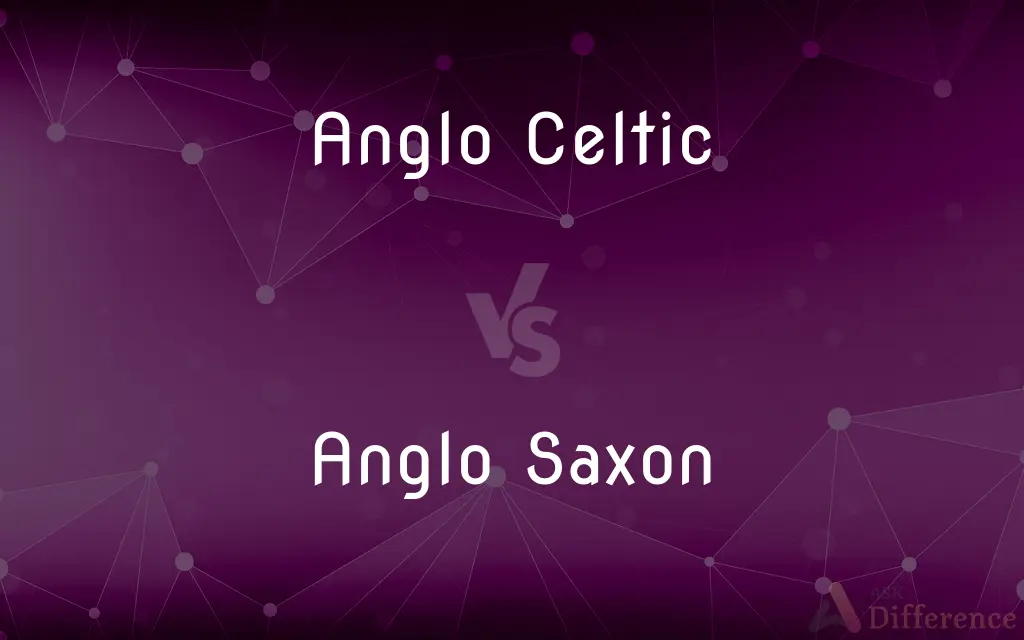Anglo Celtic vs. Anglo Saxon — What's the Difference?
By Tayyaba Rehman — Published on January 27, 2024
Anglo Celtic refers to cultures and peoples of Celtic origin in Britain and Ireland, while Anglo Saxon pertains to the Germanic tribes who settled in England during the early Middle Ages.

Difference Between Anglo Celtic and Anglo Saxon
Table of Contents
ADVERTISEMENT
Key Differences
Anglo Celtic broadly encompasses the cultures, languages, and histories of the Celtic peoples of the British Isles, including Irish, Scottish, Welsh, and Cornish cultures. Anglo Saxon refers specifically to the period and people in early medieval England, descended from Germanic tribes.
The cultural heritage of the Anglo Celts is heavily influenced by ancient Celtic traditions, folklore, and languages. In contrast, Anglo Saxon heritage is characterized by its Germanic roots, seen in its language (Old English), literature, and legal systems.
Linguistically, Anglo Celtic includes Celtic languages like Welsh, Gaelic, and Breton. Anglo Saxon, meanwhile, contributed significantly to the development of the English language through Old English.
In terms of art and literature, Anglo Celtic cultures are known for their distinct Celtic art, music, and mythology. Anglo Saxon culture produced unique artistic styles and seminal literary works like Beowulf.
Historically, the Anglo Celts have a history that predates the Roman invasion of Britain, while the Anglo Saxons played a crucial role in the early medieval history of England, post-Roman rule.
ADVERTISEMENT
Comparison Chart
Cultural Origin
Celtic peoples of the British Isles
Germanic tribes in early medieval England
Language
Celtic languages like Welsh, Gaelic
Old English, a Germanic language
Cultural Heritage
Ancient Celtic traditions
Germanic roots and influences
Art and Literature
Distinct Celtic art, music, mythology
Unique artistic styles, works like Beowulf
Historical Period
Predates Roman Britain
Early medieval post-Roman England
Compare with Definitions
Anglo Celtic
Historically rooted in the Celtic peoples of the British Isles.
The ancient Anglo Celtic monuments stood as a testament to their rich history.
Anglo Saxon
Characterized by Old English language and literature.
He was an expert in Anglo Saxon literature, especially in works like Beowulf.
Anglo Celtic
Influenced by ancient Celtic traditions and folklore.
The Anglo Celtic art exhibit showcased intricate Celtic knot designs.
Anglo Saxon
Pertains to the cultural period in England post-Roman rule.
The museum's Anglo Saxon exhibit displayed artifacts from the 5th century.
Anglo Celtic
Includes Irish, Scottish, Welsh, and Cornish cultures.
She explored her Anglo Celtic heritage during her trip to Wales.
Anglo Saxon
Influenced by Germanic roots and traditions.
The Anglo Saxon legal system laid the foundation for modern English law.
Anglo Celtic
Encompasses languages such as Welsh and Gaelic.
He studied the Anglo Celtic language of Cornish for his research.
Anglo Saxon
A member of one of the Germanic peoples, the Angles, the Saxons, and the Jutes, who settled in Britain in the fifth and sixth centuries.
Anglo Celtic
Pertaining to the cultures and peoples of Celtic origin in Britain and Ireland.
The Anglo Celtic festival celebrated traditional Gaelic music.
Anglo Saxon
Any of the descendants of the Anglo-Saxons, who were dominant in England until the Norman Conquest of 1066.
Anglo Saxon
See Old English.
Anglo Saxon
A person of English ancestry.
Anglo Saxon
Of, relating to, or characteristic of Anglo-Saxons, their descendants, or their language or culture; English.
Anglo Saxon
Of or pertaining to the Anglo-Saxons or their language; as, Anglo-Saxon poetry; The Anglo-Saxon population of Scotland.
Anglo Saxon
A Saxon of Britain, that is, an English Saxon, or one the Saxons who settled in England, as distinguished from a continental (or "Old") Saxon.
Anglo Saxon
The Teutonic people (Angles, Saxons, Jutes) of England, or the English people, collectively, before the Norman Conquest.
It is quite correct to call Æthelstan "King of the Anglo-Saxons," but to call this or that subject of Æthelstan "an Anglo-Saxon" is simply nonsense.
Anglo Saxon
The language of the English people before the Norman conquest in 1066 (sometimes called Old English). See Saxon.
Anglo Saxon
One of the race or people who claim descent from the Saxons, Angles, or other Teutonic tribes who settled in England; a person of English descent in its broadest sense.
Anglo Saxon
A person of Anglo-Saxon (esp British) descent whose native tongue is English and whose culture is strongly influenced by English culture as in "WASP for `White Anglo-Saxon Protestant'"; "this Anglo-Saxon view of things".
Anglo Saxon
A native or inhabitant of England prior to the Norman conquest
Anglo Saxon
A person of Anglo-Saxon (especially British) descent whose native tongue is English and whose culture is strongly influenced by English culture as in WASP for `White Anglo-Saxon Protestant';
This Anglo-Saxon view of things
Anglo Saxon
English prior to about 1100
Anglo Saxon
Of or relating to the Anglo-Saxons or their language;
Anglo-Saxon poetry
The Anglo-Saxon population of Scotland
Anglo Saxon
Referring to the Germanic tribes who settled in England in the early Middle Ages.
The Anglo Saxon settlement remains were discovered near the old village.
Anglo Saxon
Produced unique artistic styles during the early medieval period.
The Anglo Saxon art was renowned for its intricate metalwork and carvings.
Common Curiosities
How did Anglo Celtic art influence modern design?
Celtic knotwork and motifs from Anglo Celtic art are often seen in modern designs.
What are some examples of Anglo Saxon literature?
Works like Beowulf and the Anglo-Saxon Chronicle are key examples.
Were the Anglo Saxons originally from England?
No, they migrated from regions that are now Germany, Denmark, and the Netherlands.
Are the Anglo Celtic languages still spoken today?
Yes, languages like Welsh and Gaelic are still spoken in parts of Britain and Ireland.
What is the key difference between Anglo Celtic and Anglo Saxon cultures?
Anglo Celtic relates to the Celtic peoples of the British Isles, while Anglo Saxon pertains to Germanic tribes in medieval England.
What is unique about Anglo Celtic music?
It often features traditional instruments like the Celtic harp and bag pipes, known for their distinct melodies and rhythms.
How did Anglo Saxon culture impact modern England?
Anglo Saxon culture laid foundational aspects of English law, language, and societal structures.
Can Anglo Celtic traditions be seen in contemporary Ireland and Scotland?
Yes, many contemporary customs in Ireland and Scotland have roots in ancient Celtic traditions.
What was the Anglo Saxon period known for in terms of governance?
It was known for the development of early forms of English kingship and feudal systems.
How are Anglo Celtic languages preserved today?
Through cultural preservation efforts, education, and media in regions like Wales and parts of Ireland.
Did the Anglo Saxons speak English?
They spoke Old English, which is quite different from modern English but is its predecessor.
What role did the Anglo Celts play in British history?
They were the dominant cultures in Britain before Roman and later Anglo Saxon influences.
Were the Anglo Saxons pagans or Christians?
They were originally pagans, but gradually converted to Christianity during their time in England.
What architectural influences did the Anglo Saxons leave behind?
They left behind distinct architectural styles, notably in church building and vernacular architecture.
Do Anglo Celtic festivals still occur?
Yes, there are numerous festivals celebrating Celtic culture, music, and art in the British Isles.
Share Your Discovery

Previous Comparison
NHL vs. AHL
Next Comparison
PDLW Insurance vs. Renter’s InsuranceAuthor Spotlight
Written by
Tayyaba RehmanTayyaba Rehman is a distinguished writer, currently serving as a primary contributor to askdifference.com. As a researcher in semantics and etymology, Tayyaba's passion for the complexity of languages and their distinctions has found a perfect home on the platform. Tayyaba delves into the intricacies of language, distinguishing between commonly confused words and phrases, thereby providing clarity for readers worldwide.














































